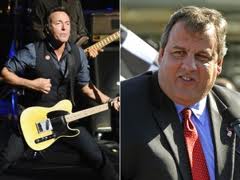A Tale of Two Bosses: Chris Christie and Bruce Springsteen

There are so many great articles in the July/August issue of The Atlantic that I could pretty much blog on it alone for the rest of year.
But the most charming article is by Jeffrey Goldberg on Gov. Chris Christie’s unrequited love for Bruce Springsteen. Christie is a real fan. He’s been to something like 130 shows, knows the words to all Springsteen’s songs (even the obscure ones), and is just awestruck by the hugely enjoyable excellence of the musical performances. He wondrously revels in the display of genius that is every Springsteen show.
Like me, Christie seems to enjoy the early Springsteen more, when the songs were about people who he really knew and grew up with and the sound employed the full majesty of the E Street Band.
The governor thinks “Thunder Road” is Bruce’s best song, and there’s evidence that he thinks the same about Born to Run as an album. I would only add that “Jungleland” is equally powerful and perhaps more mood enhancing. I think Christie and I also agree that some of Springsteen’s other especially moving compositions—both musically and lyrically—actually preceded Born to Run, such as “Spirit in the Night” and the triumphant “Rosalita.”
So Christie and I basically concur that the quality of the Boss’ artistry dropped off some as his songs became less personal and more ideological. The drop-off often isn’t all that dramatic. Many tunes that seem, to me, rather banal on the recordings—such as “The Rising” and “Youngstown”—soar when you hear them performed live.
Certainly there remains nothing like a live Springsteen performance.
Goldberg rightly notes that Christie’s obsession with Springsteen separates him from more careerist and image-driven politicians. And his political differences with Springsteen do little to nothing to undermine his love of what’s good about him. Now people say it’s the conservatives that demonize and won’t reach out to the other side to find common ground. But in this case it appears that it’s the conservative governor who is, in more than one sense, the much bigger man.
Bruce won’t meet with Christie or return the calls of the governor of the state with which he most identifies. He won’t admit that they both sincerely want what’s best for Jersey girls and boys. Nor will he join his governor in working on projects that transcend ideological differences for that state’s people.
Springsteen, we might say, can’t see the difference between Christie and some evildoer who revels in working Okies like Tom Joad to death. Can the people he actually grew up with be so in the thrall of false consciousness that they voted in big numbers for Christie for no good reason at all? Christie remarks that the guys Bruce sings about—the plumbers, the pipefitters, and so forth—not only voted for him but are with him when it comes to reining in the public-sector unions.
It’s not that Christie enjoys the part of Springsteen’s concert when he gives what’s become the customary political sermon. He just accepts it for what it is and no more:
“You want to know what he’s saying?” Christie asks. “He’s telling us that rich people like him are fucking over poor people like us in the audience, except that us in the audience aren’t poor, because we can afford to pay 98 bucks to him to see his show. That’s what he’s saying.”
Wait a second, this is Bruce Springsteen we’re talking about, the guy you adore?
“I compartmentalize,” Christie says.
Any sensible person is all about compartmentalizing when it comes to the political opinions of artists, musicians, and such. They might be right or they might be wrong. But it’s doubtful, given the direction of their gifts and hard work, that they really know what they’re talking about. And the governor gives the performer the benefit of the doubt in assuming that he sincerely doesn’t know what he’s talking about.
The governor adds that when it comes to his own business the Boss sensibly acts like a boss:
“If you talk to folks who have associated with him, he is, from a business perspective, a no-nonsense capitalist. He runs his business like a capitalist, he’s the boss, he’s in charge, he’s the one who makes the most money, he determines how much money everybody else makes. He knows about budgets.”
I’m not saying, of course, that Christie right about everything. But let’s hope that the two Jersey bosses get together soon.





